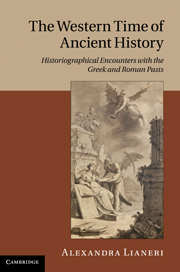Book contents
- Frontmatter
- Contents
- Acknowledgements
- Notes on contributors
- INTRODUCTION
- Unfounding times: The idea and ideal of ancient history in Western historical thought
- THEORISING WESTERN TIME: CONCEPTS AND MODELS
- ANCIENT HISTORY AND MODERN TEMPORALITIES
- UNFOUNDING TIME IN AND THROUGH ANCIENT HISTORICAL THOUGHT
- AFTERWORD
- Bibliography
- Index
Unfounding times: The idea and ideal of ancient history in Western historical thought
from INTRODUCTION
Published online by Cambridge University Press: 03 May 2011
- Frontmatter
- Contents
- Acknowledgements
- Notes on contributors
- INTRODUCTION
- Unfounding times: The idea and ideal of ancient history in Western historical thought
- THEORISING WESTERN TIME: CONCEPTS AND MODELS
- ANCIENT HISTORY AND MODERN TEMPORALITIES
- UNFOUNDING TIME IN AND THROUGH ANCIENT HISTORICAL THOUGHT
- AFTERWORD
- Bibliography
- Index
Summary
TIME AND CRITIQUE
Any new interpreter must be aware of past interpreters: he who is not aware of past interpreters will still be influenced by them, but uncritically, because, after all, awareness is the foundation of criticism. The historian must therefore be able to account not only for all the data he possesses, but also for all the interpretations he is aware of.
Such was the critical task posed by a master of the discipline of history, whose object of study was not the past as a realm that delimits certain events and actions, but historical thought in context: the modes of speaking and writing through which the past locates itself within history and in doing so makes a claim to historical knowledge that both conditions and confronts that of the present. Readers of Arnaldo Momigliano's writings will remember his penetrating remarks about the critical role of the history of historiography in the field of historical research. The works of past historians, as this excerpt implies, do not enter the present fields of historical investigation as any other cultural product of the past. These works are undoubtedly part of the same historical matrix that gives rise to all other forms of cultural production. Yet, as an object of historical knowledge, past historical thought acquires a distinct relation to the subject of knowing constituting at once its precondition and its alternative.
- Type
- Chapter
- Information
- The Western Time of Ancient HistoryHistoriographical Encounters with the Greek and Roman Pasts, pp. 3 - 30Publisher: Cambridge University PressPrint publication year: 2011
- 2
- Cited by

